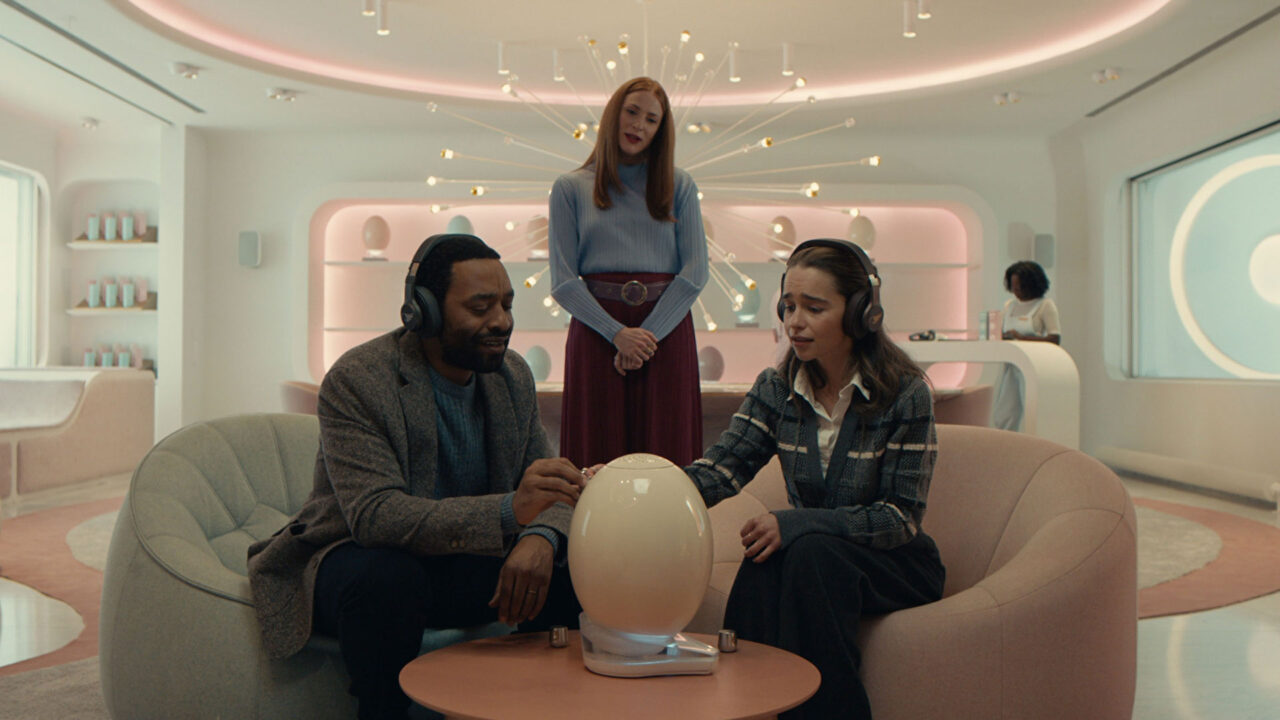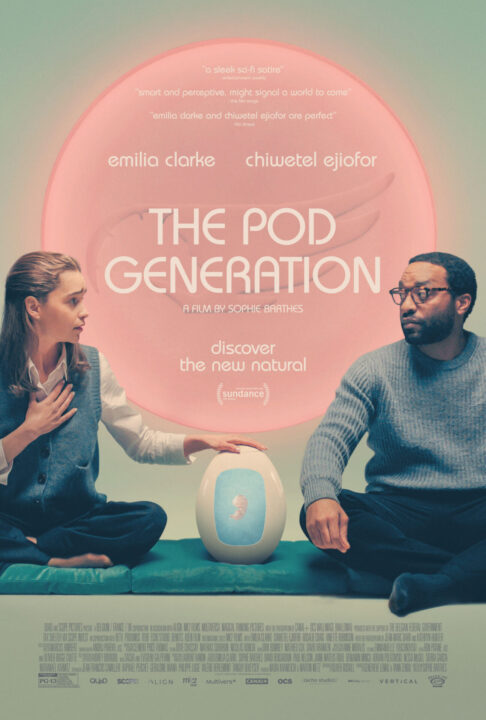The more we intertwine technology with our lives, the more honest we must be in asking ourselves what we are losing as humans by doing so. Because if we don’t, it’s going to overtake humanity completely.
This is the idea that the entertaining and interesting sci-fi comedy The Pod Generation considers by way of its eerily comic premise about a couple who decide to begin a family and circumvent nature by using an artificial womb in the shape of a sleek, mobile pod.
Written and directed by Sophia Barthes, The Pod Generation smartly observes and satirizes this modern moment and what we as humans may forget we are giving up to embark on the frictionless futures that we have furthered by our fetish with AI and technology.
Set in the very near future, The Pod Generation follows Rachel (Emilia Clarke) and her botanist husband Alvy (Chiwetel Ejiofor), a loving couple who is ready to start a family.
When Rachel lands a highly coveted spot at The Womb Center–a facility that offers families artificial wombs (or “pods”) to have surrogate children–they nervously move ahead with their decision to conceive, beginning their tech-paved path to parenthood.
Sophie Barthes’ third feature is a sleekly designed, sharply observed sci-fi comedy that works on a number of comedic and more philosophically worthwhile levels.
As a lighthearted comedy, Barthes depicts the silliness of the modern (and near-future) moment, showing how pregnancy with a pod might look the same as remembering to charge your iPhone.
Funny lines that come from The Womb Center executives, like offering eager new parents their service of playing podcasts for their developing newborns so that babies aren’t “bored” in utero are completely laugh-worthy.
But Barthes also observes deeper questions too, such as examining our relationship with nature. It’s a poignant moment when Alvy says “We decided nature was a commodity, and that’s when everything started to unravel.”
Further, The Pod Generation also communicates interesting perspectives on gender roles in society, by way of showing how traditional pregnancy inhibits a woman’s freedoms in a much larger way than a man’s.
In fact, the pitch that The Womb Center gives Rachel and Alvy, is that when a woman is liberated from having to carry a baby, and the toll that takes on the body, then both parents are able to be more participatory and continue living their lives. “No woman is free until she has control over her reproductive system,” they say.
The other side to that coin is that Rachel’s job only offers her a pod-based child so that a mobile pregnancy can allow her to continue to be productive at work, ultimately fueling capitalist ideology.
The world that is built is incredibly well designed, with Andrij Parekh’s cinematography capturing the smooth, rounded-off edges of this neat future world.
Emilia Clarke is wonderful in the lead role, able to lend her comic skill in the film’s funnier moments, as well as express more heartfelt emotion in sequences where she dreams of herself carrying her baby naturally.
Chiwetel Ejiofor is perfectly cast here too. His love for nature and botany provides the necessary pause to go headfirst with the artificial womb. His chemistry with Clarke makes for a good pairing that ends the film on a note of real contemplation over technology.
I was definitely more entertained by the beginning of the film, all the way up through the middle after the “conception.” The film slows down once we start seeing the advance of the pregnancy and how they interact with the egg-shaped pod, which loses steam resting on conventionality.
Overall, The Pod Generation is a timely movie about the growing influence of AI and tech and also the things that we are willing to give up for resistance-free living. It’s a future that we’ll need to truly think about before deciding to bring any other generations into it.
109 minutes. PG-13 for brief strong language, suggestive material, and partial nudity.
Ryan Rojas
Ryan is the editorial manager of Cinemacy, which he co-runs with his older sister, Morgan. Ryan is a member of the Hollywood Critics Association. Ryan's favorite films include 2001: A Space Odyssey, The Social Network, and The Master.


